


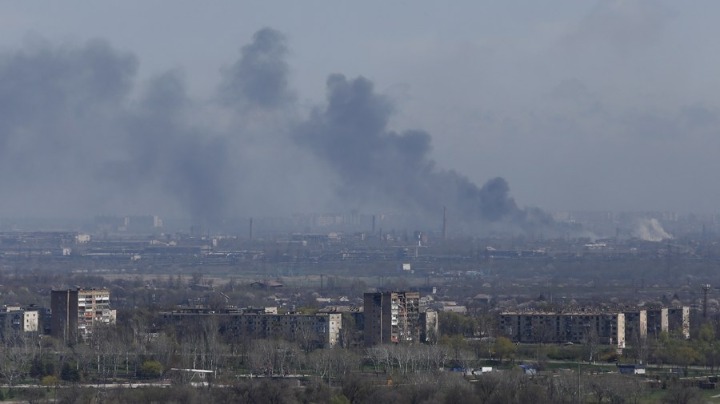
Russia's President Vladimir Putin says his country will continue its yearlong "special military operation" in Ukraine, and he accused the US-led NATO alliance of fanning the flames.
Russia-Ukraine conflict would have cost world economy $1.6 trillion in 2022, according to a study published by the German Economic Institute.
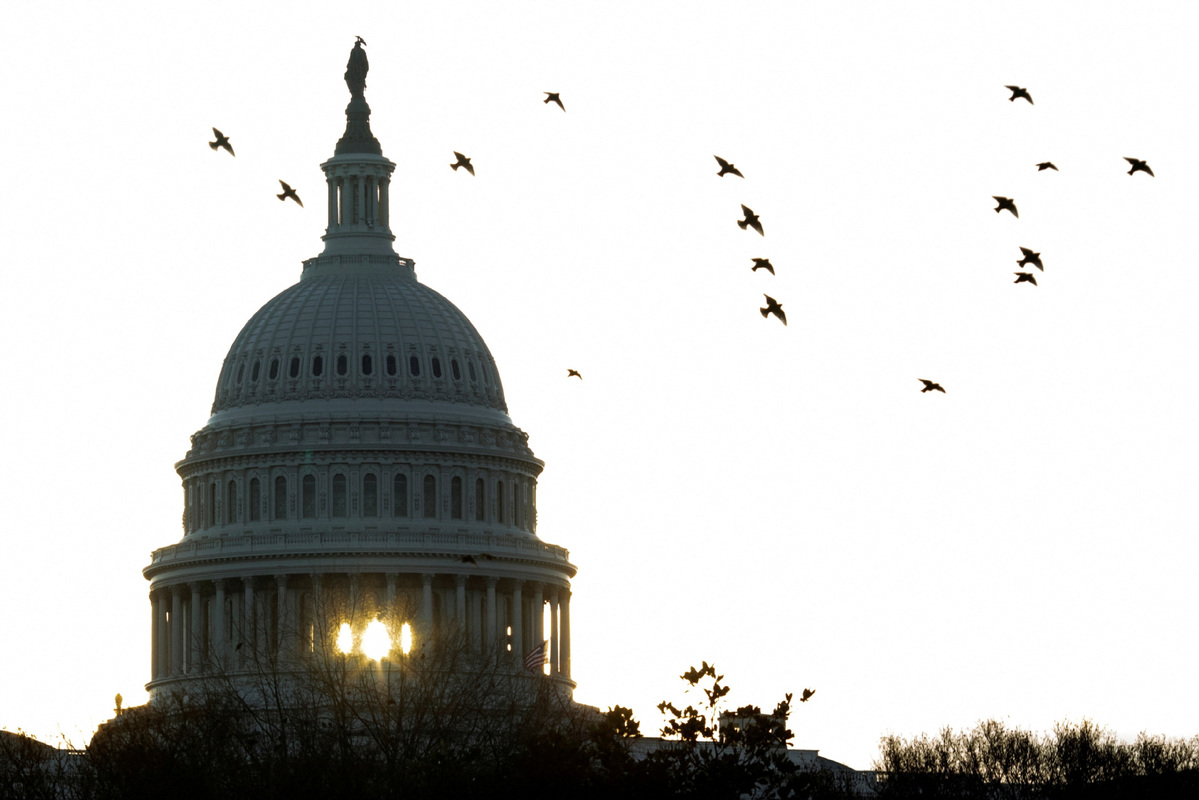
Any proposal that fails to address the root cause of the ongoing Russia-Ukraine conflict will not bring an end to the fighting and secure a comprehensive, just and lasting peace, as urged by a resolution the United Nations Security Council passed on Thursday, just hours before the conflict entered its second year on Friday.
Instead of just focusing on what happened over the past year, the international community should not ignore the fact that it is the United States' animosity toward Russia that has driven the North Atlantic Treaty Organization's continuous eastward expansion. This has led to Moscow changing its view on the West, from a partner in the distance to an enemy at the gate.
That the Cold War bloc has been relentlessly pushing eastward while Russia is still suffering from the aftermaths of the collapse of the Soviet Union has aggravated Moscow's sense of insecurity. It is that threat to Russia that has been unprovoked, rather than Russia's "special military action" in Ukraine, which is just what the US expected to reap from what it has sown.
That's why the US is in no hurry to help end the conflict. It wants it to drag down Russia and reassert its authority over Europe. Not to mention the tremendous profits it can make by selling arms and energy.
For Russia, the West's actions represent a security crisis. For the US, the conflict, which it frames as being a struggle between democracy versus autocracy, is not only the culmination of its years-long campaign to debilitate Russia, but also an opportunity to stake a claim to the moral high ground by criticizing those countries which refuse to join its unilateral sanctions on Russia.
Countries should look objectively at the rights and wrongs of the matter rather than let themselves be swayed by the moral burden the US is trying to put on them.
Among the other permanent members of the UN Security Council, China is the only one that has not joined the US in its sanctions on Russia or provided Ukraine with arms, nor has it provided support to Russia regarding its "special military action". Its position on the Ukraine crisis is neutral and it continues to urge the belligerents to agree on a cease-fire and talk.
China's ties with Russia are not subject to any party's approval, nor its relations with Ukraine. And the crisis is not in China's interests.
As the position paper China issued on Friday states, the security of a region will not be achieved by strengthening or expanding military blocs, and the security of a country should not be pursued at the expense of others.
It is absurd for Washington to try and claim the moral high ground while it continues to impose sanctions on Russia, which are unauthorized by the UN and have no legitimacy in international law, continues to supply ever more advanced long-range weapons to Ukraine, and encourages its NATO allies to do the same.
In waging its proxy war against Russia, the US is the primary aggressor. Putting a stop to those actions is the very first step to creating the necessary conditions for a cease-fire and peace talks.
Dialogue and negotiation are the only viable solution to the Ukraine crisis. But although Ukraine is a sovereign state, it is being funded and supported to such an extent by the US club, that even if Kyiv wants to talk with Moscow, so long as Washington doesn't want it to, Kyiv has no choice but to continue to fight.
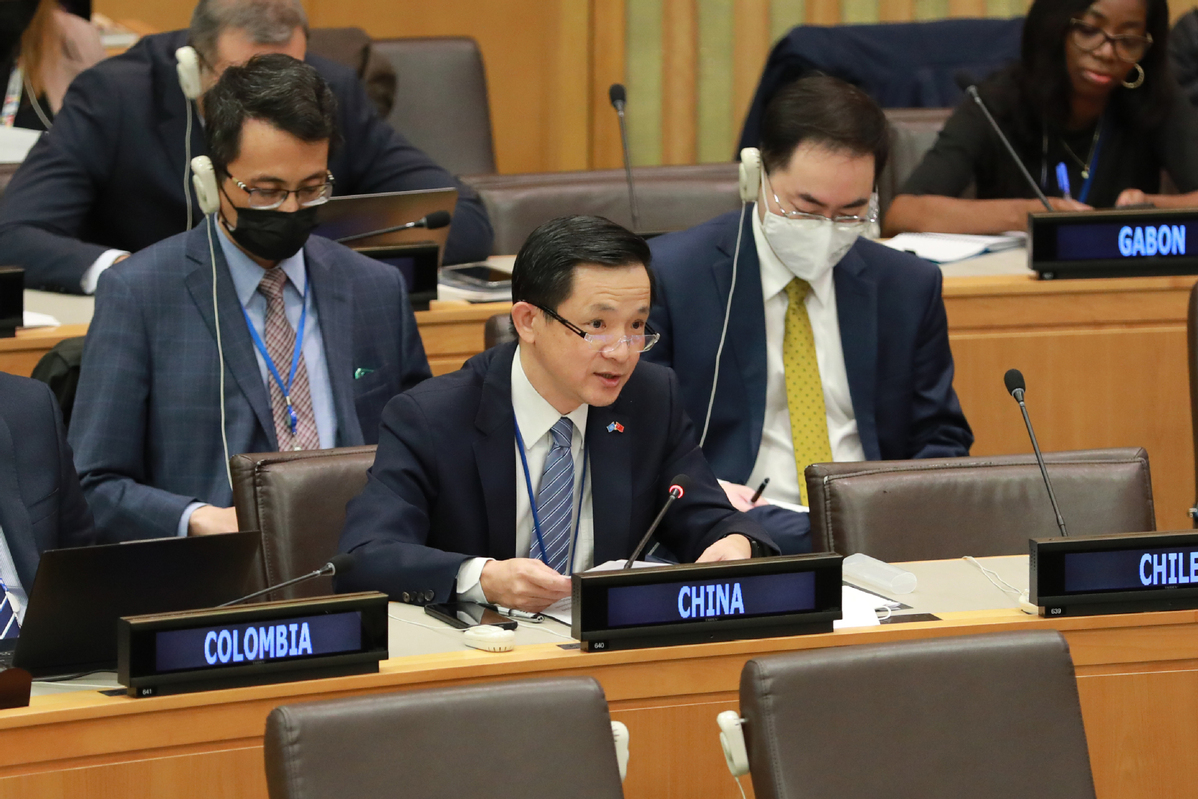
A Chinese envoy to the United Nations on Thursday told a resumed emergency special session of the UN General Assembly on Ukraine that facilitating a cease-fire is a top priority, and the international community should work together to promote peace talks.
"China's position on the Ukraine issue is consistent and clear. The sovereignty and territorial integrity of all countries should be respected. The purposes and principles of the UN Charter should be upheld," said Dai Bing, charge d'affaires at the Chinese Permanent Mission to the UN.
"The legitimate security concerns of all countries should be taken seriously. And all efforts conducive to peaceful resolution of the crisis should be supported," he said.
The 11th emergency session of the General Assembly resumed on Wednesday two days before the first anniversary of the conflict between Russia and Ukraine.
"The top priority is to facilitate cease-fire and cessation of hostilities without delay," Dai emphasized, adding that conflicts and wars have no winners. "The longer the brutality, the greater the human suffering," he said.
He called on the parties to the conflict to remain rational, restrain their impulses, and prevent the crisis from getting worse or even out of control.
"The parties to the conflict should strictly abide by international humanitarian law, avoid attacking civilians and civilian infrastructure, protect women, children, and other victims of the conflict, and respect the basic rights of prisoners of war," said Dai. "Parties should strictly abide by the Convention on Nuclear Safety and guard against man-made nuclear accidents."
Dai reiterated that nuclear weapons cannot be used. "Nuclear war cannot be fought. All parties should join together against the use or threat of use of nuclear weapons, prevent nuclear proliferation, and avoid a nuclear crisis," he said.
Dai said dialogue and negotiation are "the only viable way to resolve the Ukraine crisis".
"The lessons of history tell us that crises, however deep, can ultimately be resolved peacefully. No matter how difficult it is, the door to a political solution cannot be closed," he said.
"We support Russia and Ukraine in moving towards each other, resuming direct dialogue as soon as possible, bringing their legitimate concerns into the negotiation, setting out feasible options, and giving a chance to an early end of the crisis and the rebuilding of peace," he said.
Dai said the international community should strive to facilitate peace talks. "One year into the Ukraine crisis, brutal facts have offered ample proof that sending weapons will not bring peace; adding fuel to the fire will only exacerbate tensions, and prolonging and expanding the conflict will only make ordinary people pay an even heftier price.," he said.
"We reiterate our appeal that diplomacy and negotiation cannot be abandoned, and efforts towards cease-fire and talks must go on," he said, adding that the international community "should create conditions for this to happen, rather than fanning the flames and seeking self-interest".
"We urge the countries concerned to stop abusing unilateral sanctions and long-arm jurisdiction. Instead, they should act in a way conducive to de-escalation," said Dai.
The Russia-Ukraine crisis has presented EU decision-makers with a pile of policy challenges
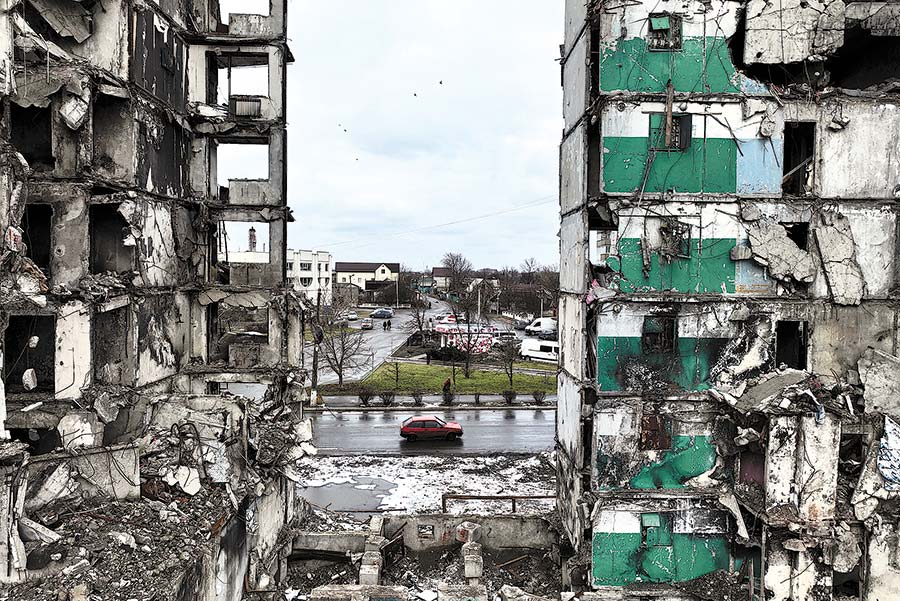
The Ukrainian flag of two horizontal bands, yellow over blue, has appeared in many corners of European cities over the past year, including being illuminated on the facade of the Berlaymont building that houses the European Commission in Brussels, to demonstrate support for Kyiv in the Russia-Ukraine conflict.
The conflict, which began a year ago, and for which no end is in sight, has resulted in tremendous changes in the security, political and economic landscape of the European Union and its 27 member states, experts say.
Ding Chun, director of the Center for European Studies at Fudan University in Shanghai, said: "The conflict has broken the peace, tranquillity and security structure in the EU and dealt a blow to its economic growth and social stability, spoiling its pandemic recovery efforts.
"The EU and its member states, which overall support Ukraine and are against Russia, have been engaged in an unprecedented seesaw battle of sanctions and counter-sanctions with Russia, plunging the EU into a situation of killing 1,000 of its enemies but losing 800 of its own soldiers," Ding said, citing a Chinese idiom.
The European Commission has urged member states to endorse its proposed 10th round of sanctions against Russia by Friday, but some are raising questions about what the sanctions, which were supposed to be crippling, have achieved.
The Russian economy shrank a modest 2.2 percent last year, the International Monetary Fund says, in sharp contrast to the 10-15 percent fall that Western financial houses had predicted. The IMF also forecast Russian economic growth of 0.3 percent this year and 2.1 percent next year.
Germany, the largest EU economy, is forecast to grow only 0.1 percent this year and 1.4 percent next year, and the 20-member eurozone by 0.7 percent this year and 1.6 percent next year.
In the EU, high energy prices are biting hard. An analysis by the think tank Bruegel in Brussels says EU states have earmarked or allocated 681 billion euros ($726 billion) to help households and companies tackle the energy crisis.
While the EU reduced its imports of Russian energy, the United States has ramped up its fossil fuel sales to the bloc and will become its largest energy supplier this year.
Last year the US exported nearly 10 million cubic meters of LNG to the EU a month, 137 percent more than in 2021, providing about half of all of Europe's imported LNG.
France's Finance Minister Bruno Le Maire and Germany's Economy Minister Robert Habeck have both accused the US of profiting from the Ukraine conflict and energy crisis and making Europe dependent on its LNG.
Qin Yan, a carbon analyst in Oslo with the financial data provider Refinitiv, said the US, as a major energy exporter, has no doubt secured large windfall profits as a result of rising European demand for non-Russian fossil fuels.
The EU energy crisis is far from over despite the recent drop in gas prices and a relatively mild winter, she said. "With the global gas market already being tight and the economic recovery boosting energy demand, European countries need to bid higher for LNG prices to attract deliveries."
Washington has also benefited from increasing its arms sales last year as European countries rushed to buy US weapons because of the conflict.
Early last month the US State Department said US weapons sales to Europe rose by 49 percent last year from $34.8 billion in 2021.
Germany was one of the biggest US arms buyers in Europe, ordering 35 F-35 fighter jets and munitions and equipment worth $8.4 billion in July.
The conflict has prompted the EU to break its taboo of not providing arms to countries involved in military conflict and has prompted many member states to increase their defense budgets, Ding said.
"For quite a while the EU will give priority to hard military power, geopolitics and security over what it prided itself earlier: globalization and the green and digital revolution," Ding said.
EU autonomy setback
The conflict has resulted in a warming of trans-Atlantic relations, a dramatic revival of NATO and a setback for the EU's strategic autonomy, he said, referring to a concept pushed by France's President Emmanuel Macron since 2017.
Macron has described NATO as "brain dead", but last year Finland and Sweden submitted applications to join the alliance.
Roderick Parkes, research director of the German Council of Foreign Relations, wrote in a paper last month that the Ukraine conflict has accelerated a 15-year trend in Europe that has pushed political authority away from a Franco-German core toward the fringes and front-line states, "away from the north-south axis of Paris and Berlin toward an east-west one now bracketed by the UK and Poland".
Lai Suetyi, a researcher at the Center for European Studies at Guangdong University of Foreign Studies in Guangzhou, said the conflict "brings Europe, as well as the world, back to the past, the Cold War past".
Such a large conflict in Europe reminds Europeans why they started the European integration project, she said.
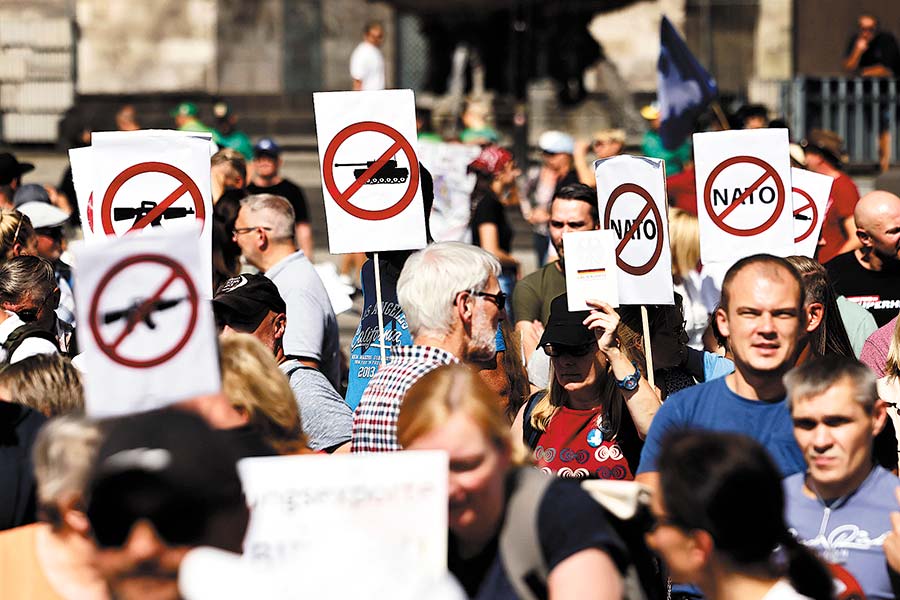
As the US and its allies supply more weapons to Ukraine, peace activists have voiced their objections and are organizing demonstrations across Europe to call for a halt to the escalation of the Russia-Ukraine conflict.
Stop the War Coalition, an advocacy group in the United Kingdom, is mobilizing people to go to the streets in central London on Saturday to demand peace talks and oppose warmongering in the name of military support.
The coalition said the London demonstration will be part of a Europe-wide weekend of action, starting in Italy on Friday with a 24-kilometer march from Perugia to Assisi.
Rafaella Bolini of the Italian peace movement estimated that there will be protests in at least 100 towns and cities this weekend. "Feeling in Italy is running high against supplying arms to Ukraine. The movement is mobilizing everywhere," she said.
According to the coalition, demonstrations are planned for seven cities in Portugal. In Vienna, there is a protest on Saturday and another in Zurich on Sunday. Protests will be staged in 20 cities, including in Berlin, with action in Brussels on Sunday and protests across France throughout the weekend.
Lindsey German, a convener of the coalition, said at an online rally ahead of the planned demonstrations that Europe is "sleepwalking" into a much wider conflict by sending more weapons to Ukraine.
The UK hosted a program to train Ukrainian soldiers, and Prime Minister Rishi Sunak has announced that it will train Ukrainian jet pilots.
Opposition voiced
On the other side of the Atlantic, Medea Benjamin, founder of the peace group Codepink, has been on a 50-city speaking tour of the US, trying to stoke opposition to supplying weapons.
"What comes after that? Is it troops? Is that nuclear weapons? So-called leaders in the West are taking us directly into either a wider world war or a nuclear war," she said.
Many peace organizations are coming out to oppose the escalation of the conflict.
Kate Hudson, general secretary of the Campaign for Nuclear Disarmament, said arms manufacturers are benefiting from this conflict at the cost of the people, not only those of Ukraine and Russia, who are dying, but also people in the countries sending weapons.
"Untold billions are being spent by governments who then also say there is no money for public services or for decent wages," she said.
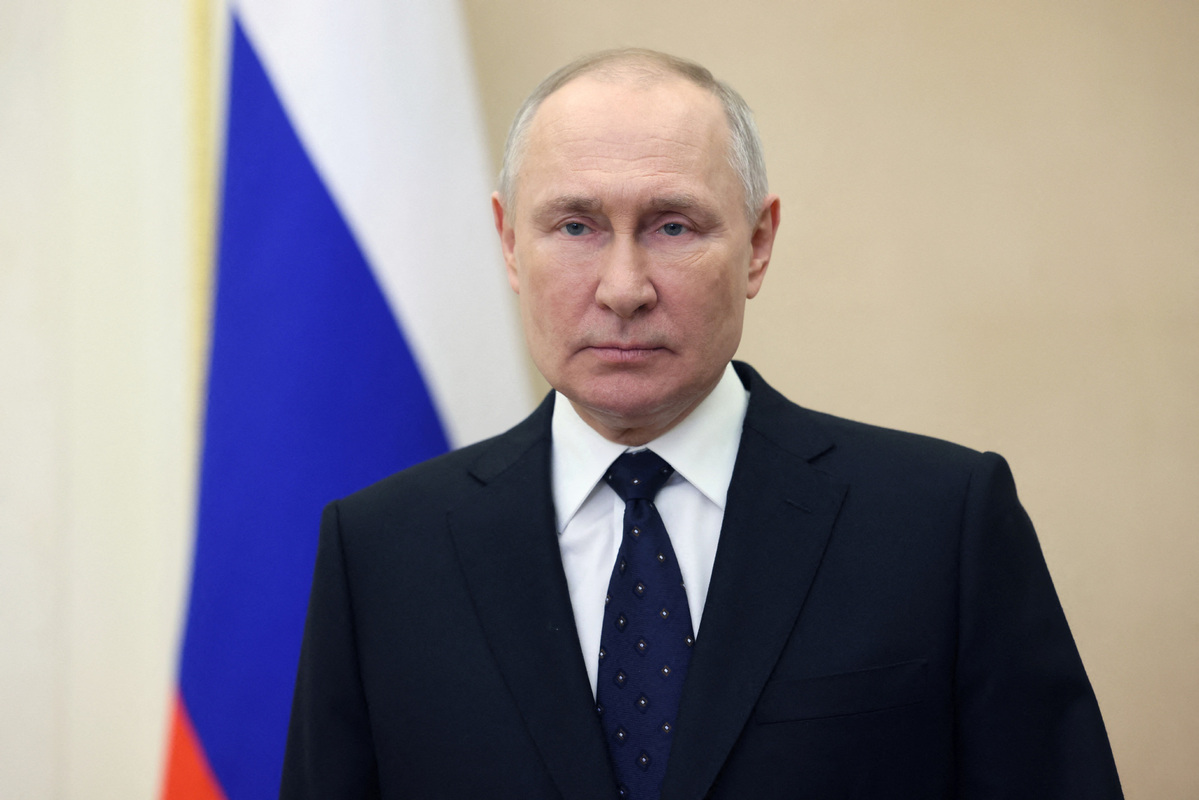
Russian President Vladimir Putin on Thursday called Russia's army a guarantor of national stability, promising to boost arms production.
"A modern, efficient army and navy are a guarantee of the country's security and sovereignty, a guarantee of its stable development and its future," Putin said in a video address on the occasion of the annual Defender of the Fatherland Day holiday in Russia.
Putin also committed to Russia strengthening its nuclear triad and a military force structure capable of launching three types of nuclear weapons.
Russia's Foreign Ministry has said the country will still observe limits imposed by the New START nuclear weapons treaty. Earlier Russia said it was suspending its participation in the treaty.
European Union countries failed to reach an agreement on Wednesday on new sanctions against Russia, and planned more talks, Reuters quoted diplomats as saying.
More talks among representatives of EU members were due on Thursday afternoon, said the sources.
Talks between Sweden, Finland and Turkiye would resume in mid-March, Swedish Prime Minister Ulf Kristersson told local media on Wednesday night.
Turkiye has postponed a trilateral meeting with Sweden and Finland on their NATO bids slated for February.
Agencies and Xinhua contributed to this story.
BEIJING - China has called for international efforts to create conditions for the resumption of peace talks to resolve the Ukraine crisis.
China on Friday released a paper stating its position on the political settlement of the Ukraine crisis, saying dialogue and negotiation are the only viable solution to the Ukraine crisis.
The international community should stay committed to the right approach of promoting talks for peace, help parties to the conflict open the door to a political settlement as soon as possible, and create conditions and platforms for the resumption of negotiation. China will continue to play a constructive role in this regard, said the paper.
All parties must stay rational and exercise restraint, avoid fanning the flames and aggravating tensions, and prevent the crisis from deteriorating further or even spiraling out of control, it said.
All parties should support Russia and Ukraine in working in the same direction and resuming direct dialogue as quickly as possible, so as to gradually deescalate the situation and ultimately reach a comprehensive ceasefire, it added.
All measures conducive to easing the humanitarian crisis must be encouraged and supported, and parties to the conflict should avoid attacking civilians or civilian facilities, protect women, children and other victims of the conflict, and respect the basic rights of prisoners of war (POWs), the paper said.
China opposes armed attacks against nuclear power plants or other peaceful nuclear facilities, said the paper, adding that the threat or use of nuclear weapons should be opposed, and nuclear proliferation must be prevented and nuclear crisis avoided.
The following is the full text.
China's Position on the Political Settlement of the Ukraine Crisis
1. Respecting the sovereignty of all countries. Universally recognized international law, including the purposes and principles of the United Nations Charter, must be strictly observed. The sovereignty, independence and territorial integrity of all countries must be effectively upheld. All countries, big or small, strong or weak, rich or poor, are equal members of the international community. All parties should jointly uphold the basic norms governing international relations and defend international fairness and justice. Equal and uniform application of international law should be promoted, while double standards must be rejected.
2. Abandoning the Cold War mentality. The security of a country should not be pursued at the expense of others. The security of a region should not be achieved by strengthening or expanding military blocs. The legitimate security interests and concerns of all countries must be taken seriously and addressed properly. There is no simple solution to a complex issue. All parties should, following the vision of common, comprehensive, cooperative and sustainable security and bearing in mind the long-term peace and stability of the world, help forge a balanced, effective and sustainable European security architecture. All parties should oppose the pursuit of one's own security at the cost of others' security, prevent bloc confrontation, and work together for peace and stability on the Eurasian Continent.
3. Ceasing hostilities. Conflict and war benefit no one. All parties must stay rational and exercise restraint, avoid fanning the flames and aggravating tensions, and prevent the crisis from deteriorating further or even spiraling out of control. All parties should support Russia and Ukraine in working in the same direction and resuming direct dialogue as quickly as possible, so as to gradually deescalate the situation and ultimately reach a comprehensive ceasefire.
4. Resuming peace talks. Dialogue and negotiation are the only viable solution to the Ukraine crisis. All efforts conducive to the peaceful settlement of the crisis must be encouraged and supported. The international community should stay committed to the right approach of promoting talks for peace, help parties to the conflict open the door to a political settlement as soon as possible, and create conditions and platforms for the resumption of negotiation. China will continue to play a constructive role in this regard.
5. Resolving the humanitarian crisis. All measures conducive to easing the humanitarian crisis must be encouraged and supported. Humanitarian operations should follow the principles of neutrality and impartiality, and humanitarian issues should not be politicized. The safety of civilians must be effectively protected, and humanitarian corridors should be set up for the evacuation of civilians from conflict zones. Efforts are needed to increase humanitarian assistance to relevant areas, improve humanitarian conditions, and provide rapid, safe and unimpeded humanitarian access, with a view to preventing a humanitarian crisis on a larger scale. The UN should be supported in playing a coordinating role in channeling humanitarian aid to conflict zones.
6. Protecting civilians and prisoners of war (POWs). Parties to the conflict should strictly abide by international humanitarian law, avoid attacking civilians or civilian facilities, protect women, children and other victims of the conflict, and respect the basic rights of POWs. China supports the exchange of POWs between Russia and Ukraine, and calls on all parties to create more favorable conditions for this purpose.
7. Keeping nuclear power plants safe. China opposes armed attacks against nuclear power plants or other peaceful nuclear facilities, and calls on all parties to comply with international law including the Convention on Nuclear Safety (CNS) and resolutely avoid man-made nuclear accidents. China supports the International Atomic Energy Agency (IAEA) in playing a constructive role in promoting the safety and security of peaceful nuclear facilities.
8. Reducing strategic risks. Nuclear weapons must not be used and nuclear wars must not be fought. The threat or use of nuclear weapons should be opposed. Nuclear proliferation must be prevented and nuclear crisis avoided. China opposes the research, development and use of chemical and biological weapons by any country under any circumstances.
9. Facilitating grain exports. All parties need to implement the Black Sea Grain Initiative signed by Russia, Türkiye, Ukraine and the UN fully and effectively in a balanced manner, and support the UN in playing an important role in this regard. The cooperation initiative on global food security proposed by China provides a feasible solution to the global food crisis.
10. Stopping unilateral sanctions. Unilateral sanctions and maximum pressure cannot solve the issue; they only create new problems. China opposes unilateral sanctions unauthorized by the UN Security Council. Relevant countries should stop abusing unilateral sanctions and "long-arm jurisdiction" against other countries, so as to do their share in deescalating the Ukraine crisis and create conditions for developing countries to grow their economies and better the lives of their people.
11. Keeping industrial and supply chains stable. All parties should earnestly maintain the existing world economic system and oppose using the world economy as a tool or weapon for political purposes. Joint efforts are needed to mitigate the spillovers of the crisis and prevent it from disrupting international cooperation in energy, finance, food trade and transportation and undermining the global economic recovery.
12. Promoting post-conflict reconstruction. The international community needs to take measures to support post-conflict reconstruction in conflict zones. China stands ready to provide assistance and play a constructive role in this endeavor.
Editor's note: As the Russia-Ukraine conflict started one year ago, humanitarian crises have occurred in many areas in the world. Many people have been touched by the conflict in varying ways, such as displacement or food shortage. Here are some of the ways in which people have been most severely affected.

The United Nations High Commissioner for Refugees said more than 8 million refugees had fled Ukraine for other European countries as of Feb 15.
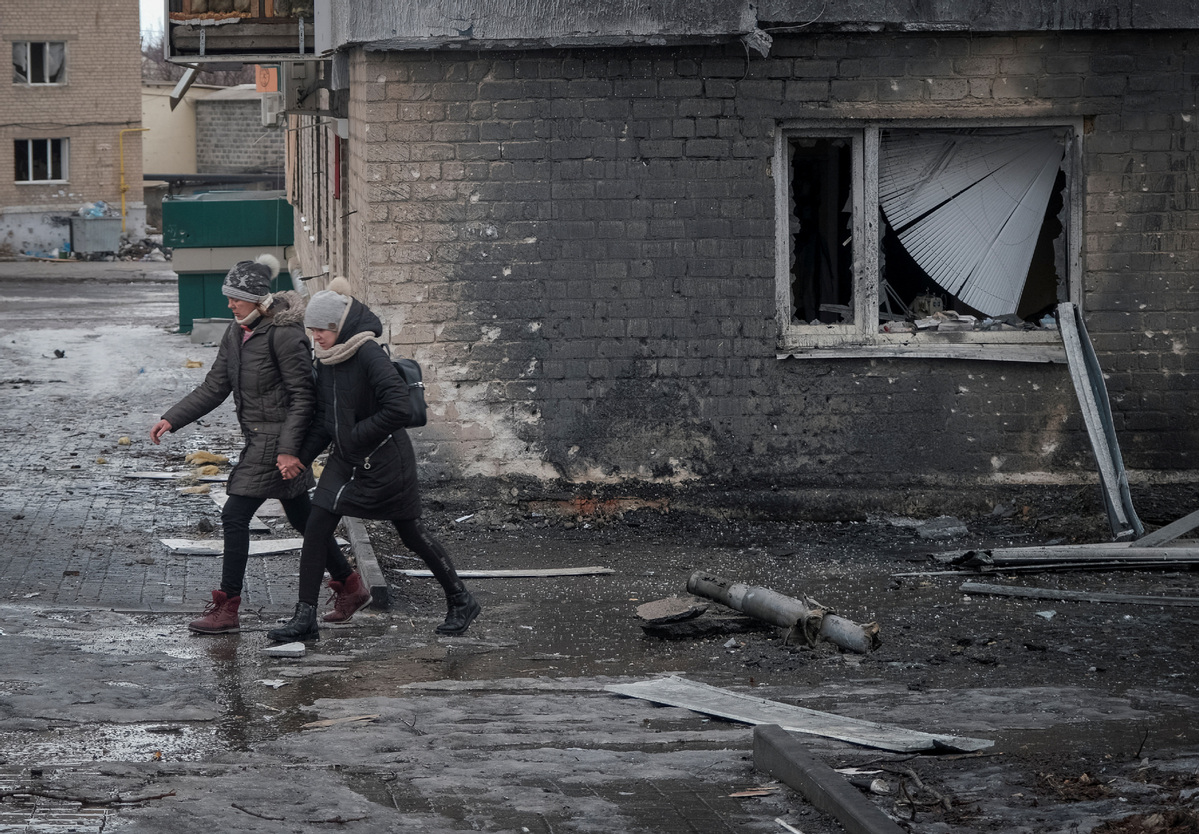
Millions of people are living without electricity during the winter in Ukraine. Millions more have little to no access to heat, clean water and other basic supplies.
The destruction of water sources in particular has left as many as 16 million people without access to clean water or sanitation and at increased risk of water-borne illnesses, according to the International Rescue Committee.
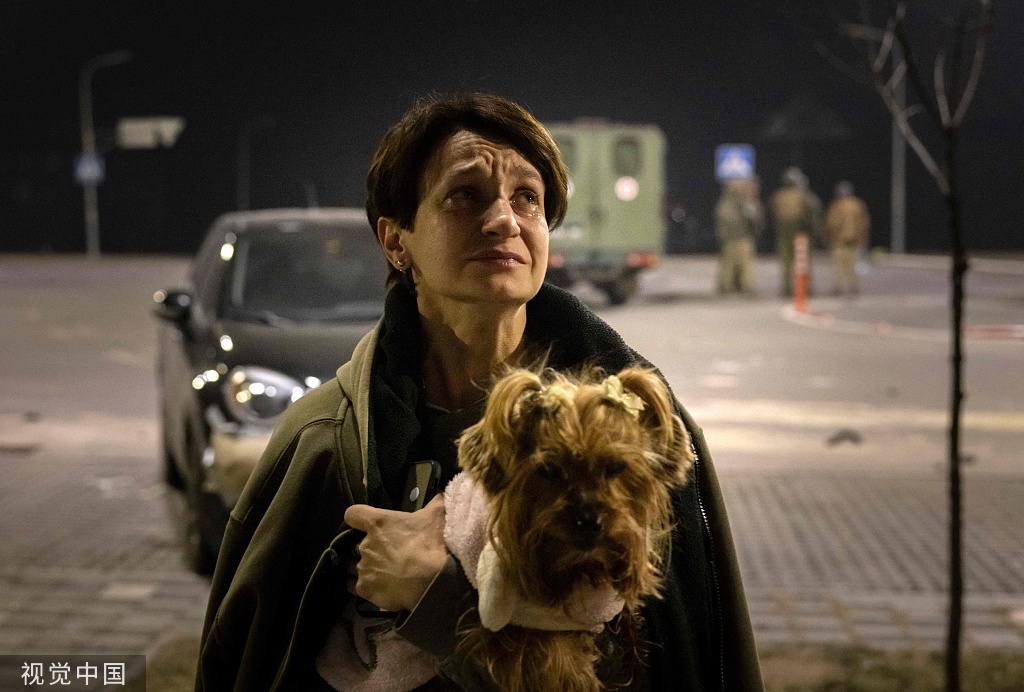
The number of people in need of humanitarian aid and protection increased from approximately 3 million people at the start of the year to nearly 18 million a few months later, according to the United Nations Office for the Coordination of Humanitarian Affairs.
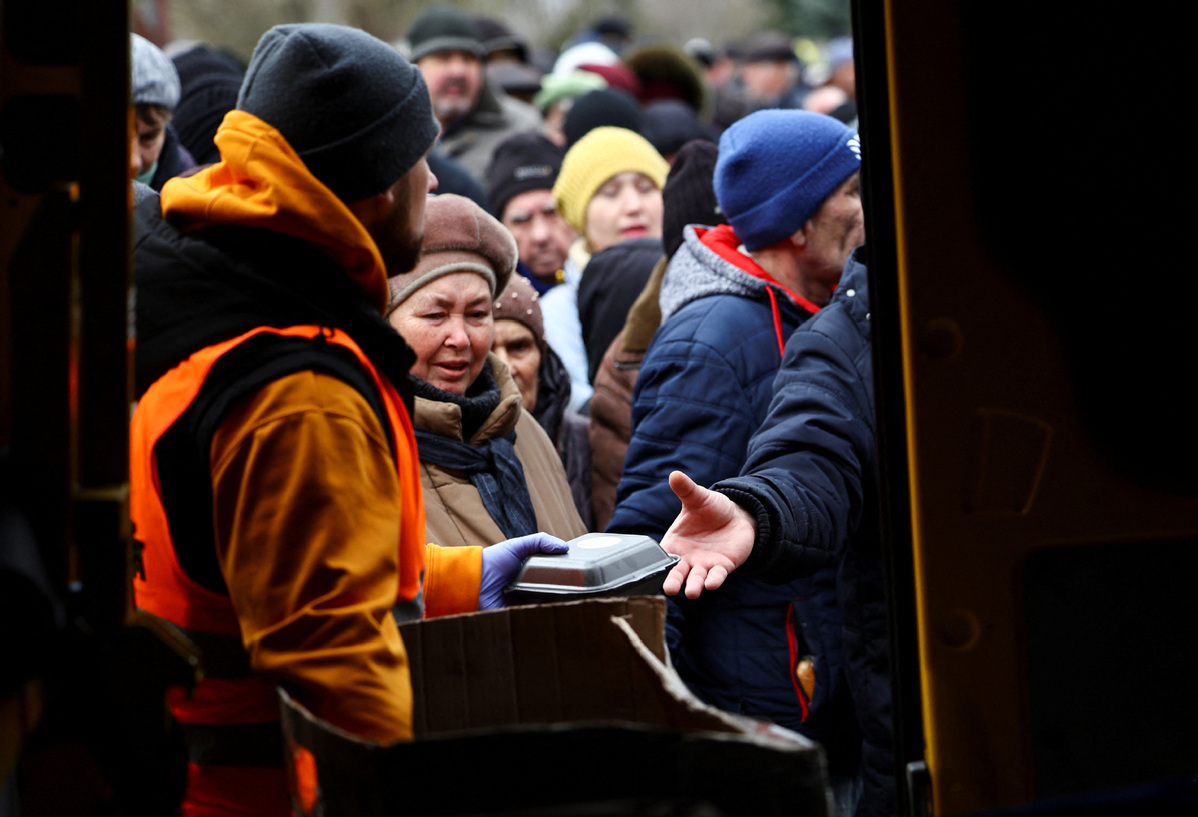
According to the Food and Agriculture Organization of the United Nations, about 205 million people in 45 countries and regions were in a state of food insecurity at the level of "crisis" or more severe in 2022.
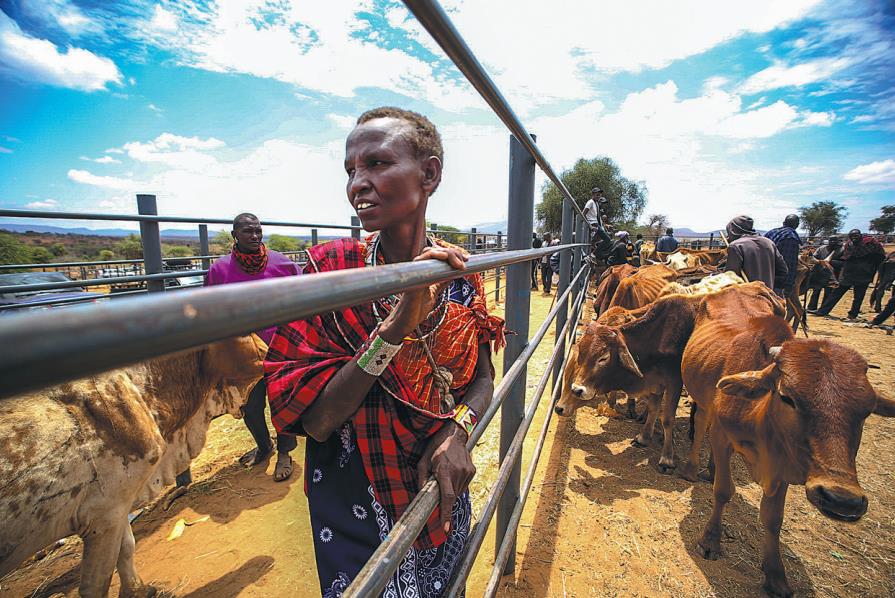
Blockades of Ukrainian grain exports have worsened hunger in some of the world's most vulnerable regions. East Africa is facing a looming famine, 21.7 million people don't have access to sufficient food, and 1.5 million children are at risk of life-threatening malnutrition, according to the International Rescue Committee.
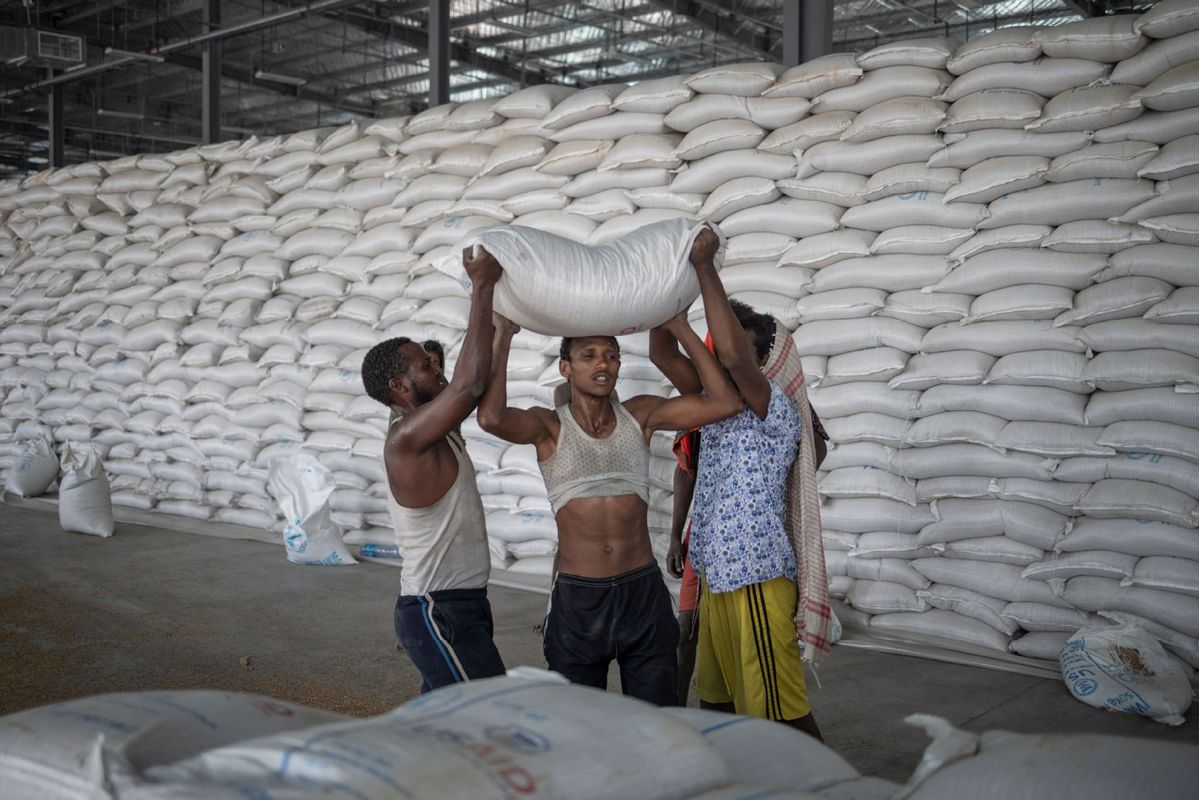
The world's poorest have been affected the most severely. The World Bank estimates 10 million people in the world fall into extreme poverty for every one percent increase in price of food grains.
Since the outbreak of the crisis in Ukraine last year, problems have emerged on all fronts, and the confrontations and conflicts between religions, cultures, and societies have been deepening.
The international community should focus on promoting peace talks, encouraging Russia and Ukraine to return to negotiations, and accumulating conditions of an early cease-fire. Two experts share their views on the issue with China Daily.
Unlike the US’ approach trying to turn the crisis into an indefinite war, China truly promotes peace, said Benyamin Poghosyan,chairman of the Center for Political and Economic Strategic Studies, Yerevan, Armenia.
The conflict between Russia and Ukraine has been going on for a year, and the situation on the battlefield is still at a stalemate.
The largest conflict since the beginning of the 21st century has caused a large number of casualties and incalculable property losses among combatants and civilians on both sides. It also has caused a complex global crisis in the supply chains of energy, food and other commodities, as well as the global industrial chain, severely slowing down the recovery of a world economy already in the doldrums.
At the annual meeting of the World Economic Forum in Davos in January, nearly two-thirds of the chief economists surveyed predicted that the world economy could still be in recession this year.
It goes without saying that an early end to the Russia-Ukraine conflict would serve not only the interests of the two countries and the European region, but also the common interests of all countries in the world. However, due to the fact that Russia and Ukraine have not yet reached a minimum consensus on the conditions for a truce, the United States-led NATO group has been escalating sanctions against Russia and increasing military aid to Ukraine. So the hope of resolving the conflict is very slim.
During the G20 Summit in Bali, Indonesia, in November, leaders of China and the US put up three issues that needed to be seriously considered. First, there are no winners in conflicts; second, there are no simple solutions to complex issues; and third, confrontation between major powers must be avoided. The formation of principled consensus among countries on these three issues is a prerequisite for promoting peace and talks to resolve the Russia-Ukraine conflict.
First, the conflict has brought untold disasters to both countries. It is impossible for either side to achieve a unilateral, complete victory through fights on the battlefield. Moreover, with the increasing intensity of the conflict, it may cause unpredictable spillover risks to Europe and the world at large.
In November, when meeting with visiting German Chancellor Olaf Scholz, President Xi Jinping proposed that the international community should jointly support all efforts to peacefully resolve the Ukraine crisis, oppose the use or threat of use of nuclear weapons, ensure the stability of global industrial and supply chains, and provide winter aid to civilians in areas affected by the crisis. These proposals are in line with the interests of the world and mankind and should become the common principles for the international community in resolving the Russia-Ukraine conflict.
Second, the Ukraine crisis has a complex historical background. It is the result of intensified conflicts in European security and also the product of geopolitical games between major powers. On April 4 last year, while meeting with German and French leaders via video link, President Xi made it clear that the sovereignty and territorial integrity of all countries should be respected, the purposes and principles of the United Nations Charter should be observed, the legitimate security concerns of all countries should be taken seriously, and all efforts conducive to a peaceful settlement of the crisis should be supported.
The unilateral acquisition of absolute security is the ideological root of the tragedy of the conflict between Russia and Ukraine. As an indivisible security community, human society can truly resolve complex international security issues only when guided by a security concept that advocates cooperation and sustainability.
Third, the confrontation between major powers is bound to bring untold disasters to the parties concerned and the whole world, which should be the most profound warning to mankind from the Russia-Ukraine conflict.
It is an old formula of the Cold War mentality to strengthen unity at home and within a group of countries through the way of making foreign enemies. It is actually an act of international hegemony and bullying, which has become increasingly unpopular around the world. It is against this background that Western countries, including the US, have repeatedly said they have no intention of creating a "new Cold War", but meanwhile clearly regard China as their main competitor and Russia as their biggest security threat.
The Russia-Ukraine conflict is the latest proof that making enemies and creating confrontation does not bring sustainable benefits to any country or group of countries.
Friday marks the one-year anniversary of the outbreak of the Russia-Ukraine conflict, and the world is once again at a crossroads in history. It is not clear when the conflict will end, but it is clear that cooperation brings win-win results and conflict creates a lose-lose situation.
Data show that, so far, NATO member states have provided Ukraine with at least $40 billion in military aid, which is equivalent to 25 percent of the country's gross domestic product in 2021. It also means that, in effect, each Ukrainian has received $1,000 in aid, based on a prewar population of 40 million. Unfortunately, instead of benefiting Ukrainians, this aid will turn into weapons that will destroy their homeland.
It is a shame that such a tragedy is happening in the 21st century. All countries should join hands to promote peace talks and bring the world back on the right track of harmonious coexistence and win-win cooperation.
The author is deputy director of the Chinese Academy of Social Sciences' Institute of Russian, Eastern European and Central Asian Studies.
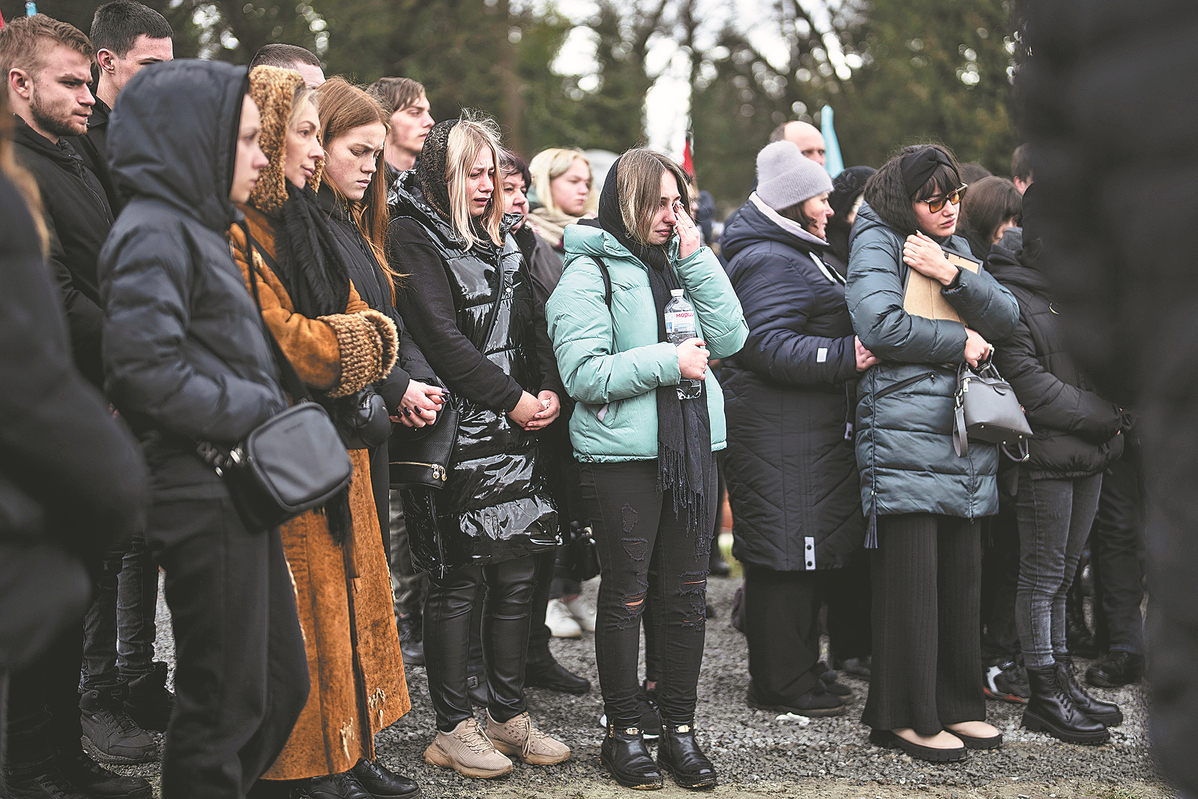
The West and the rest of the world are sharply divided in their views on the Russia-Ukraine conflict and the ensuing global order, according to a survey released on Wednesday by the European Council on Foreign Relations.
Friday marks the one-year anniversary of Russia's special military operation in Ukraine.
The survey was conducted in China, India, Turkiye, the United States, Great Britain, Russia and nine European Union nations.
According to the survey, 65 percent of the respondents in Great Britain, 55 percent in the US and 54 percent in the nine EU nations see Russia as their avowed "adversary". Many people in these countries also agree they should help Ukraine win the conflict.
For 80 percent of the respondents in India, 79 percent in China and 69 percent in Turkiye, Russia is either an "ally" or a "necessary partner".
Also, 54 percent in India, 48 percent in Turkiye and 42 percent in China support a quick end to the crisis.
People in these three countries, as well as in Russia, consider the emergence of a "multipolar world order" more probable than a "bipolar arrangement" between China and the US.
In contrast to opinions in the West, people in many non-Western countries appear to believe that the post-Cold War era is over.
The paradox of the Russia-Ukraine conflict is that "the West is both more united and less influential in the world than ever before", said Mark Leonard, co-founder of the European Council on Foreign Relations and co-author of a report based on the survey.
Emerging powers, such as India and Turkiye, will act on their own terms and resist being caught in a conflict between the US and China, according to Leonard's report.
It said that one of the most striking findings of the survey is that most people, both within and beyond the West, believe the US-led liberal order is coming to an end.
Only 9 percent of the respondents in the US, 7 percent in the EU countries and 4 percent in Great Britain see US global supremacy as the most likely state of affairs a decade from now. Most people in the EU nations and the US expect a bipolar world led by the US and China.
But outside the West, people believe that "fragmentation", not "polarization", will mark the next international order. Respondents in China, India, Turkiye and Russia predict that the West will soon be just one global pole among many. The West may still be the strongest party, but it will not have "hegemonic" control, they believe.
The survey also found that people in China, India and Turkiye are skeptical of the West's claims about defending democracy in Ukraine.
A vast majority of Chinese and Turkish respondents said that the West's support for Ukraine is motivated by reasons other than the defense of Ukraine's territorial integrity or its democracy.
Many in China said the West's support is driven by the desire to protect Western dominance.
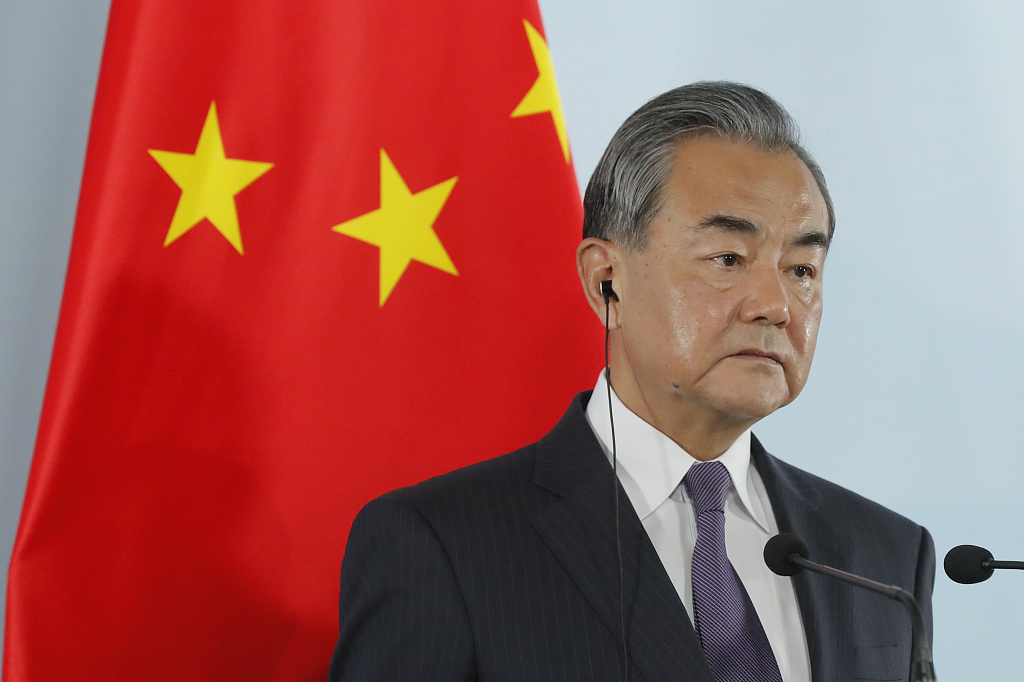
Senior diplomat: Peaceful settlement of crisis mustn't be delayed indefinitely
Senior diplomat Wang Yi said on Thursday that China has encouraged and supported all efforts conducive to a peaceful settlement of the Ukraine crisis and has actively promoted the de-escalation of the situation, as he wrapped up a weeklong Eurasian tour.
The trip, which took him to four European Union countries and Russia, came as the Ukraine crisis approached its first anniversary, which falls on Friday.
With the Ukraine crisis occurring in Europe and influencing the whole world, Wang, a member of the Political Bureau of the Communist Party of China Central Committee and also director of the Office of the Foreign Affairs Commission of the CPC Central Committee, said settlement of the crisis must not be delayed indefinitely.
He called on Europe to think carefully about "what conditions should be created for a cease-fire, what framework is required to bring lasting peace and stability in Europe, and what role Europe should play to truly reflect its strategic autonomy".
On the sidelines of the Munich Security Conference in Germany, Wang met with leaders and diplomats from more than 10 countries, including Ukrainian Foreign Minister Dmytro Kuleba. While in Russia, he also exchanged views with Russian President Vladimir Putin on the Ukraine issue.
Wang said that all parties, though divided in their positions, appreciate China's objective stance and calm attitude, and they expect Beijing to play a more active role in the political settlement of the issue.
China will put forward a position paper on a political settlement of the Ukraine crisis soon, Wang said, adding that the paper will reiterate China's stance and incorporate all countries' legitimate concerns.
As it is a strong aspiration of peoples of all countries to make the world a safer place, Wang said no country has the privilege of having its own way in the world and engaging in double standards or exceptionalism. He also emphasized that any hegemonic, domineering or bullying practices should be rejected.
Having chosen Europe as his first overseas destination this year, Wang called for China and the EU to remove external disruptions, properly manage differences and step up exchanges and cooperation.
Doing so would inject valuable stability into the turbulent international situation and be of great significance in promoting a political solution of the Ukraine issue, he said.
Wang highlighted that China-EU relations are of "global and strategic" significance, saying that the two are partners, not rivals, and represent opportunities rather than threats to each other.
Wang also said that President Xi Jinping's in-depth exchanges with EU leaders through face-to-face talks, virtual meetings and phone calls more than 20 times over the past year played a leading strategic role in advancing China-EU ties.
Meanwhile, as the direction and impact of China-United States relations go far beyond the scope of bilateral ties and concern world peace and security, Wang urged Washington to show sincerity and face up to and redress the damage to Sino-US relations of the abuse of force against the Chinese unmanned airship that accidentally entered US airspace and was shot down by the US military on Feb 4.
During an unofficial meeting with US Secretary of State Antony Blinken on Feb 18 on the sidelines of the Munich Security Conference, Wang urged Washington to "stop doing such absurd things out of domestic political needs".
Wang said that "if the US continues to dramatize, hype up or escalate the situation, China will surely respond by doing what is necessary".
Though the US is unscrupulously trying to suppress and contain China, the great rejuvenation of the Chinese nation is unstoppable, as China's development has a strong, inherent driving force and inevitable historical logic.
He urged the US to abandon the obsolete Cold War mentality, adopt an objective and fair perception of China and return to a rational and pragmatic China policy.
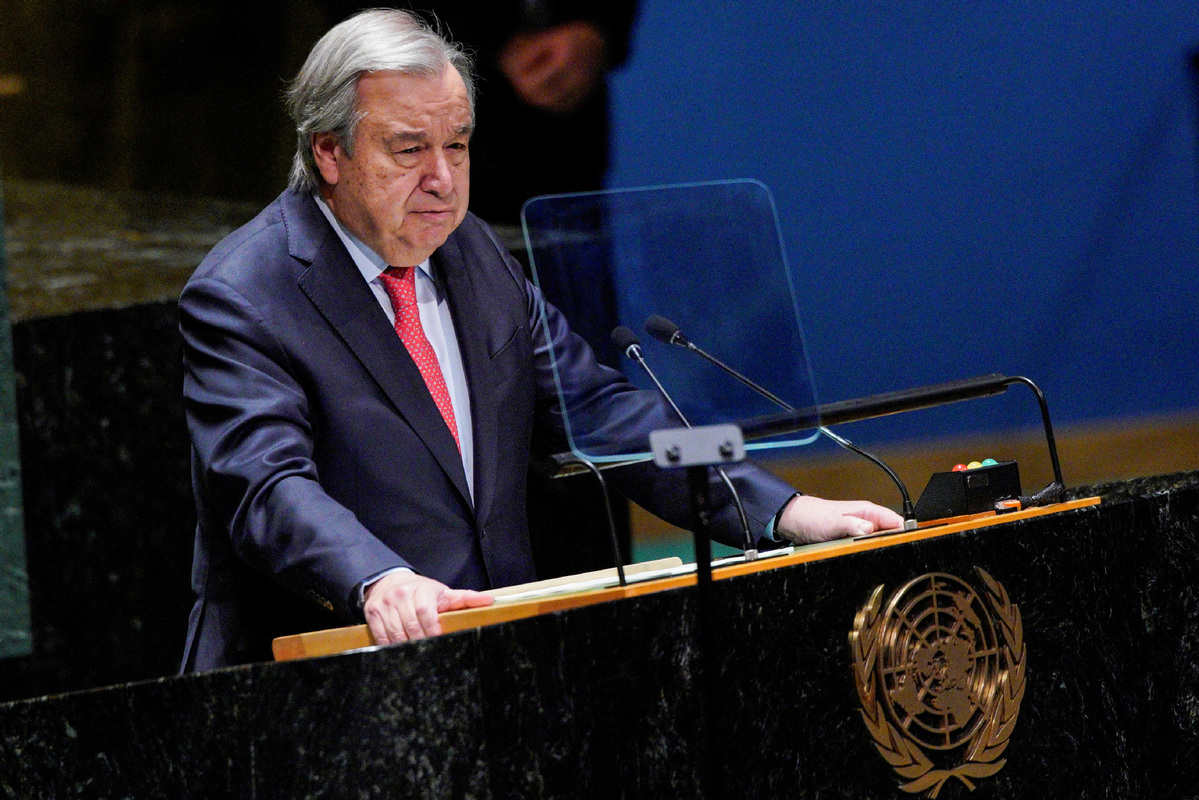
UNITED NATIONS -- UN Secretary-General Antonio Guterres warned Wednesday that an escalation of the conflict in Ukraine is "a clear and present danger."
"Over the past year, not only have we seen suffering and devastation grow, it is also becoming more evident just how much worse it could all still become. The possible consequences of a spiraling conflict are a clear and present danger," he told a resumed emergency special session of the UN General Assembly.
The conflict in Ukraine is also fanning regional instability and fueling global tensions and divisions, while diverting attention and resources from other crises and pressing global issues, he said.
"Meanwhile, we have heard implicit threats to use nuclear weapons. The so-called tactical use of nuclear weapons is utterly unacceptable. It is high time to step back from the brink," he said.
Guterres called for peace.
People in Ukraine are suffering enormously. Ukrainians, Russians and people far beyond need peace, he said. "While prospects may look bleak today, we must all work, knowing that genuine, lasting peace must be based on the UN Charter and international law."
The longer the fighting continues, the more difficult this work will be, he warned. "We don't have a moment to lose."
The 11th emergency special session of the General Assembly resumed on Wednesday as the conflict between Russia and Ukraine is approaching its first anniversary.

Editor's note: As Feb 24 marks the one-year anniversary of Russia's special military operation in Ukraine, China Daily is reviewing how it has reshaped geopolitics, impacted the global economy and aggravated the energy crisis.
The yearlong conflict between Ukraine and Russia is showing dangerous signs of escalation, evidenced this week by US President Joe Biden's surprise visit, when he pledged to support Kyiv for "as long as it takes".
In their outlooks for 2023, the World Bank and the International Monetary Fund both identified escalation in the conflict as a major downside risk for the global economy, predicting that global growth could decelerate sharply to 1.7 percent and 2.9 percent respectively.
Now 12 months into the conflict, that risk appears to have become a reality on the ground, prompting calls for an early settlement of the issue.
Dan Steinbock, an advocate of the multipolar world and founder of the Difference Group, said the conflict in Ukraine had entered a new, more dangerous phase on Jan 25, with the commitment for some 70 US, German, British and Polish tanks foreshadowing a potentially lethal escalation.
"Not only will economic and human costs climb even further, but strategic risks, including the potential of nuclear confrontation, will soar," Steinbock wrote in an article on the first anniversary of what he called "the unwarranted Ukraine proxy war".
"With such escalation in high-tech arms sales to Ukraine, regional and military spillovers are no longer a matter of principle but a matter of time," he added.
Cal Jillson, a political scientist and historian at Southern Methodist University, Dallas, said that the conflict does not seem poised to end any time soon.
"Its length from here is likely measured in many months, if not years. Given Western support, Ukraine has the will to hold out, and Putin shows no willingness to retreat," he said in an email interview. "Hard to see any real winners here. No peacemakers in sight."
On Monday, Biden made an unannounced visit to Kyiv, promising more military aid and vowing to support Ukraine for "as long as it takes".
"The United States has said repeatedly that we are going to continue what we are doing, which is arming Ukraine for as long as it takes, but we never defined what it is," Chas W. Freeman, former US assistant secretary of defense for international security affairs, told China Daily.
In its Global Economic Prospects report released on Jan 10, the World Bank revised down its 2023 forecasts for 95 percent of advanced economies and nearly 70 percent of emerging market and developing economies, citing concerns including elevated inflation, higher interest rates and disruptions caused by the conflict in Ukraine.
Freeman, now a senior fellow at the Watson Institute for International and Public Affairs, said World Bank predictions, and the IMF's, seem realistic.
"The impact of this (conflict in Ukraine) on the world is too great — food shortages, energy shortages, supply chains being broken, people being killed, people starving. This has to end," Freeman said.
At this point, the most important thing is to find a conflict-termination strategy, have a cease-fire and create a process, perhaps under United Nations supervision, for negotiation of a settlement, Freeman said.
He said resolving the conflict is a delicate diplomatic task that cannot be accomplished quickly.
"But perhaps, if the UN, with the international community acting through the UN, appoints a mediator or a group to mediate this, we can start addressing these two tasks: Ending the war and redesigning European security architecture," Freeman said.
In "Avoiding a Long War: US Policy and the Trajectory of the Russia-Ukraine Conflict", researchers at Rand Corp said global economic disruptions stemming from the crisis will continue and possibly multiply as the conflict goes on.
Energy price rises sharply
The ensuing sharp increase in energy prices has in turn contributed to inflation and slowing economic growth globally, Samuel Charap and Miranda Priebe, senior political scientists at the Rand Corp, wrote in the paper. "Since avoiding a long war is the highest priority after minimizing escalation risks, the United States should take steps that make an end to the conflict over the medium term more likely," they wrote.
The US has already played "many roles" in the Ukraine conflict: guaranteeing that Ukraine will not "lose"; weakening Russia through attrition; and demonstrating resolve to allies and opponents, said Stanley Renshon, a political scientist at the City University of New York.
"The world economy would be better without the war but not by that much. The economic headwinds the world faces go well beyond the Ukraine conflict," Renshon told China Daily.
While in Kyiv, Biden pledged an additional $500 million in US assistance on top of the more than $50 billion already provided. A day before his trip, hundreds of people gathered at the Lincoln Memorial in Washington in an anti-war rally protesting the massive amounts of US funding for Ukraine as well as the US' role in the conflict.
Biden also had a firsthand look at the devastation wrought by the conflict. "The cost that Ukraine has had to bear has been extraordinarily high," Biden said. "And the sacrifices have been far too great."
Douglas Macgregor, a retired US Army colonel and former Pentagon adviser, said "disaster wrapped in rhetoric is not the way to save the people of Ukraine".
"The victims do not live in North America. They live in a region that most Americans can't find on a map. Washington urged the Ukrainians to fight. Now Washington must urge them to stop," he wrote in the article, titled "Washington Is Prolonging Ukraine's Suffering", published on Dec 20.
Related reading
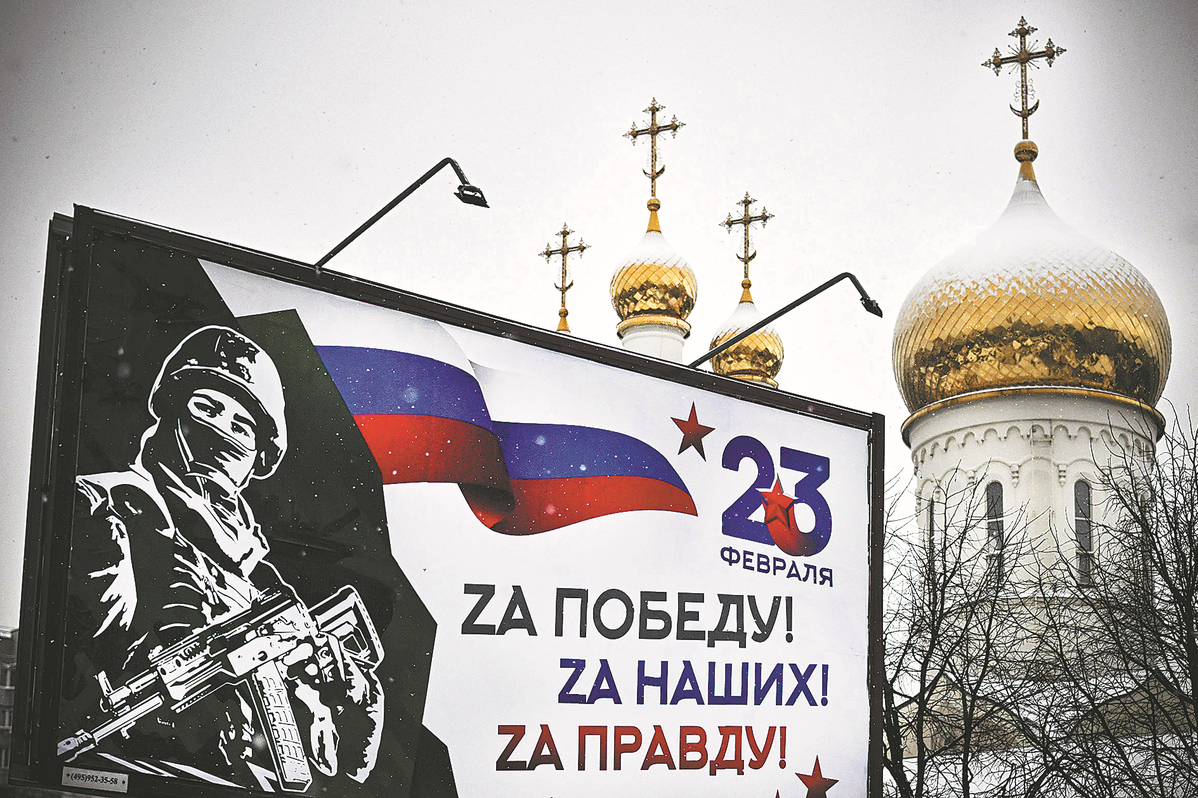
Russia and its people are living under the pressure of what seem like endless sanctions from Western countries, but they are coping with them, President Vladimir Putin says.
He made the remark at a meeting of judges of arbitration, military and common jurisdiction courts on Feb 14.
In the weeks before Russia launched what it called a "special military operation" a year ago, US President Joe Biden attempted to influence events by warning Putin of "economic consequences like none he's ever seen".
The US and its allies have imposed unprecedented economic measures on Moscow. Russia is now the world's most sanctioned country, with more than 5,500 measures aimed against it.
Initially it seemed that sanctions could be devastating for the country; it caused the value of the ruble to slide rapidly, the banking system to shudder and companies worldwide to stop exporting vital goods to Russia.
However, one year later Russia has remained more resilient than many expected, thanks to its oil and gas exports, and deft maneuvering by its central bank and others that has allowed some banned technology to sneak through.
Russia's position looked strong in the early days as the ruble remained strong, even though Western governments had frozen a large portion of the country's hard currency reserves, sanctioned financial institutions and expelled major banks from SWIFT, the international payments system.
There was a risk of a bank run at the beginning of the conflict and shortly after the sanctions were imposed, said Alexandra Prokopenko, at the time an adviser to the Russian central bank's first deputy chairwoman, now living in exile in the West.
The steps sparked financial panic, prompting lines at bank machines as people feared the ruble would crash and result in a cash shortage.
The measures banned companies globally from selling Russian computer chips and other high-tech goods the country needed to build weapons and military vehicles.
They also severed so many banking links that Russian importers had trouble paying overseas counterparts. By April Russia's imports were 43 percent below prewar levels, a recent report by the think tank Silverado Policy Accelerator in Washington said.
However, quick countermeasures by Russia's central bank soon restored a measure of stability. Officials closed down stock markets, forced the main interest rate to 20 percent, and imposed restrictions on currency exchange, withdrawals and hard-currency transfers overseas. The measures reversed the ruble's slide.
Janis Kluge, an economist at the German Institute for International and Security Affairs in Berlin, forecasts that Russia's budget deficit could reach 5 percent of GDP this year, compared with 2 percent last year, due to the drop in energy exports and the rapidly falling tax take from the declining economy.
On Thursday the European Bank for Reconstruction and Development lowered its forecast for Russia's economic growth this year to 3.5 percent but maintained its forecast for a 3 percent decline in GDP this year.
Forecasts for Russia's economic growth outlook have become a matter of contention after the International Monetary Fund forecast this month that the country's economy would grow 0.3 percent — faster than that of both Germany and the UK.
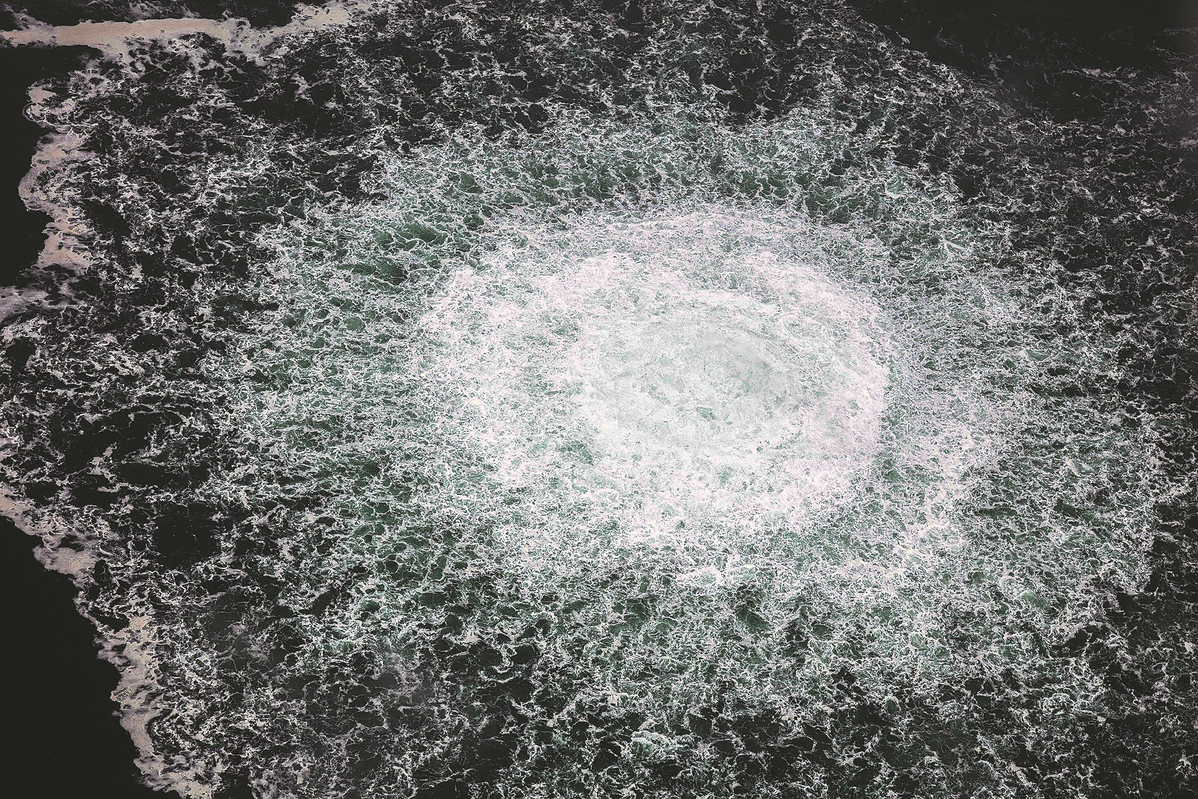
Weeks after the US investigative journalist Seymour Hersh said in a report that the United States Navy was involved in the Nord Stream explosions last year, Western mainstream media have remained largely silent, let alone done follow-up reports, experts say.
This, they say, demonstrates the hypocrisy and bias of Western news coverage.
Hersh, a Pulitzer Prize winner renowned in particular for uncovering the My Lai Massacre during the Vietnam War, wrote on the US portal Substack on Feb 8 that the Nord Steam pipelines attacks were orchestrated by the White House. The US Navy and the CIA were also involved, he said, citing an unnamed source.
If true, it could be "a terrorist act" committed by the US government against vital German infrastructure, Stephan Ossenkopp, a German scholar with the think tank Schiller Institute, told CGTN.
The US has dismissed Hersh's allegations as "utterly false and complete fiction". Denmark, Germany and Sweden said on Tuesday that blast inquiries have not yet concluded. Russia has called a United Nations Security Council meeting over the attacks.
US mainstream media have by and large remained silent on Hersh's claims. A week after the revelation, US online news portal Mint-Press reported that the 20 most influential news publications in the US, including CNN, The Wall Street Journal and The Washington Post, have essentially disregarded Hersh's story. Four media outlets gave scant attention to it, such as a report of 100 words or so by Bloomberg.
European outlets including the BBC, The Guardian and most German newspapers have ignored it, the Washington-based online magazine Responsible Statecraft said on Feb 16.
Hersh told the US broadcast Democracy Now!, published on Feb 15, that "I wasn't even thinking of taking a story like this to The New York Times", which he had worked for.
Western mainstream media "intentionally ignores" Hersh's report, said Ding Yifan, a research fellow at the Development Research Center of the State Council's Institute of World Development in Beijing.
"Any story that goes beyond their values and stance will not be published," Ding said. "Misinformation, or even disinformation, abounds in Western media, which is part of their public opinion war, or propaganda war. These are their tactics."
Responsible Statecraft quoted Mark Ames, who interviewed Hersh on the US Radio War Nerd program on Feb 11, as saying: "The corporate media is ignoring Hersh's story because they're deeply invested in the US empire and don't like stories that make the US empire look bad."
However, European media were "caught in a dilemma" on this matter, said Wang Zhen, a research professor of international politics at the Institute of China Studies, Shanghai Academy of Social Sciences.
"Dramatizing the issue will only make Europe, especially Germany, look awkward."
'Biased' coverage
The Russia-Ukraine conflict has been politicized in the US, Wang said, pointing to "one-sided and biased" news coverage. "Westernled media are intentionally amplifying any information that is unfavorable to Russia, but disseminating news favorable to Ukraine."
The West simply uses the media as a tool to serve their purpose in geopolitical wrestling, Ding said.
Early in the Russia-Ukraine conflict the West imposed economic and political sanctions on Russia, and Russian media organizations such as RT and Sputnik were targeted.
"Western media proclaim that they support freedom of speech and being impartial in their reporting, but this is total self-deception," Wang said, echoing Ding's view.
China's Foreign Ministry spokesman Wang Wenbin said on Monday that the Nord Stream pipeline explosions dealt a severe blow to the global energy market and the global natural environment. An objective, impartial and professional investigation into the explosions is called for, he said.

Concerns raised over bloc's ability to provide Ukraine armaments at speed
The European Union's executive body the European Commission is reportedly drawing up plans to allow use of the bloc's budget to pre-finance weapons and ammunition purchases for Ukraine.
The move comes ahead of the first anniversary of the conflict, and the Financial Times reports that the plan was presented to EU foreign ministers earlier this week, with the intention that it will be circulated more widely ahead of a meeting of the 27-member group's defense ministers on March 7.
Speaking at last week's international Munich security conference, EU foreign affairs chief Josep Borrell warned that with orders and supplies currently taking up to 10 months to be completed, unless urgent action was taken, Ukraine would struggle to keep defending itself.
"We are in urgent war mode," he said. "This shortage of ammunition has to be solved quickly; it is a matter of weeks."
Since March 2021, the EU has had a fund called the European Peace Facility, worth 5 and a half billion euros ($5.8 billion), described by the Council of Europe as "an off — budget instrument aimed at enhancing the EU's ability to prevent conflicts, build peace and strengthen international security, by enabling the financing of operational actions under the Common Foreign and Security Policy that have military or defense implications."
So far it has been used to reimburse individual member states for weapons they have supplied to Ukraine, but concern is growing about Europe's ability to provide the required defensive armaments at the speed that they are required.
"We need a new injection to get the defense industry moving," an unnamed official involved in the proposal told the FT. "The reality has moved beyond the current systems."
Borrell said the conflict was "a classical war" that had been overlooked in recent strategic planning, which had focused on approaches such as technological battles.
"We have taken too much time to make critical decisions such as providing battle tanks," he explained, "when everybody knows that in order to win a classical war, a classical war with manoeuvres of heavy arms, you need battle tanks. You will not win this war without this kind of arms."
The plan would work in a similar way to how Brussels provided upfront payments to pharmaceutical companies for vaccines during the pandemic, with individual member states picking up the final cost later.
Russian forces are reportedly firing a month's worth of European artillery shell manufacturing each day, with Ukraine using around one quarter of that figure, and Jens Stoltenberg, secretary-general of the NATO military alliance, has said European manufacturers are "under strain" trying to meet demand.
Legal complexities relating to what actions the EU can take mean it would not be a straightforward process, hence the delay in public comment, but Commission President Ursula von der Leyen has said agreements on advance purchases would "give the defense industry the possibility to invest in production lines now to be faster and to increase the amount they can deliver".
The list of national leaders showing support for Kyiv by visiting amid the challenges of the Russia-Ukraine conflict lengthened on Tuesday with the arrival of Italy's Prime Minister Giorgia Meloni.
Following United States President Joe Biden's visit on Monday, Meloni's trip was aimed at reiterating the NATO member state's support for Ukraine and was described by The Guardian newspaper as Meloni's most significant move since coming to power in October.
She said her nation had "provided financial, military, humanitarian, and civilian support" to Ukraine.
"And Ukraine can certainly count on Italy, because we have shown since the start ... that we were here (for Kyiv) and we will continue to be here," the Agence France-Presse news agency, or AFP, quoted her as saying.
As she arrived in Kyiv, Meloni said she was "honored" to be in the country, and that it was her "duty to be here, to reiterate the position of the Italian government, and perhaps also to personally understand what a people fighting for its freedom needs".
It was also a chance for Rome to distance itself from comments made last week by Meloni's rightwing junior coalition partner, Forza Italia leader Silvio Berlusconi, blaming Ukraine for the conflict.
Sofia Ventura, a politics professor at the University of Bologna, told The Guardian Meloni wanted to make it clear she did not share Berlusconi's view.
"It is a really important trip for Meloni, as she needs to show her reliability to (President Volodymyr) Zelensky, but more so to her US and European partners," Ventura said. "And she needs to do this knowing that her two allies (within her coalition government) are unreliable, due to their relations with Russia."
Berlusconi, a billionaire businessman and Italy's former prime minister, is a close friend of Russia's President Vladimir Putin. Italy's Deputy Premier and Infrastructure Minister Matteo Salvini has also expressed admiration for Putin and reservations about Italy's support for Ukraine.
Additionally, a recent opinion poll found more than 50 percent of Italians are against sending weapons to Ukraine and are skeptical about the need for sanctions.
The poll, conducted by Euromedia Research on Jan 24, found many Italians feared support for Ukraine would lead to an escalation of the conflict and possible NATO involvement.
Only 33.9 percent fully supported the sending of weapons.
On Monday, Zelensky told the Italian newspaper Corriere della Sera he had put Berlusconi and Salvini's comments behind him.
The Italian news agency Agenzia Nazionale Stampa Associata, or ANSA, said Meloni and her delegation wanted to make the visit ahead of the Feb 24 anniversary of the start of the conflict, to show Rome's continued support.
ANSA said the delegation crossed the Polish-Ukrainian border after meeting Poland's Prime Minister Mateusz Morawiecki and President Andrzej Duda, who are staunch supporters of Ukraine.
Mario Draghi, Meloni's predecessor, made a similar visit, in July 2022, alongside France's President Emmanuel Macron and Germany's Chancellor Olaf Scholz.
The Russia-Ukraine conflict has triggered a major shift in Japan's national security policy, turning its hitherto defense-only strategy into one that includes military expansion and counterstrike capabilities, experts said.
Japanese Prime Minister Fumio Kishida announced on Monday that the country will offer Ukraine fresh financial support worth $5.5 billion, Kyodo News reported. It has already provided Ukraine financial support worth $600 million, along with hundreds of millions of dollars worth of emergency humanitarian assistance, according to the prime minister's office.
Kishida also said he will host a video conference between the G7 leaders and Ukrainian President Volodymyr Zelensky on Friday, the anniversary of the Russia-Ukraine conflict. Japan is assuming this year's Group of Seven presidency.
In January, the Japanese prime minister visited five of the G7 nations — France, Italy, the United Kingdom, Canada and the United States — calling for a tougher stand against Russia. He said if a unilateral change to the status quo went unchallenged, the same would happen elsewhere.
Lyu Chao, director of the Institute of America and East Asia at Liaoning University in Shenyang, said that Kishida's trip was meant to clear the way for the US' Indo-Pacific Strategy. The Japanese prime minister also wanted European countries to intervene in the affairs of the Asia-Pacific.
Since the conflict began on Feb 24, 2022, Japan has taken the rare steps of sending defense equipment to Ukraine and offering refuge to those fleeing the conflict, Lyu said. The country has a pacifist postwar constitution, which limits its military capacity to ostensibly defensive measures.
In December, Japan released its three key national security strategy planning documents, namely an updated National Security Strategy, a National Defense Strategy and a Defense Build-up Plan. The conflict happened just as Japan was diving into the process of drafting these documents.
The three documents collectively put Japan on a path to acquire new military capabilities that have long been considered "taboo" in the domestic discourse on its national security policy, Lyu added.
Yuki Tatsumi, a senior fellow and co-director of East Asia Program at Stimson Center in the US, wrote in a blog that Tokyo's explicit interest in rehabilitating its indigenous defense industry and its commitment to essentially double its defense spending in the next five years are examples of how Japan is shattering its politically self-imposed constraints in its postwar national security policy.
In a commentary for the Center for Strategic and International Studies, Washington, Tsuneo Watanabe, a senior research fellow at the Sasakawa Peace Foundation, said that what is new about the three defense documents is that Japan's strategy is formulated based on the assumption that its territory could be subjected to a real military attack.
Among other changes, Tokyo has announced its intention to increase the nation's defense spending by nearly 60 percent over the next five years, abandoning an informal budget cap of 1 percent of GDP that was put in place for political purposes back in the 1970s.
"This alone represents an almost revolutionary departure from longstanding defense practices," Jeffrey Hornung, a senior political scientist at the RAND Corporation, wrote in an opinion piece published by Foreign Policy.
On Feb 14, Japanese Defense Minister Yasukazu Hamada said the country plans to buy all the Tomahawk cruise missiles it is seeking from the US "in one go in fiscal 2023"rather than over several years as initially planned, according to Kyodo News. Japan will significantly boost its long-range missile capabilities, as the Tomahawk has a maximum range of 2,500 kilometers.
According to Japan's Jiji Press, the country has started construction work for a new Self-Defense Forces base on the island of Mageshima in the southwestern prefecture of Kagoshima.
The new base will host field carrier landing practice by US carrier-borne aircraft. It will also be used by Japan's quasi-army as a supply and maintenance hub for the "defense" of Japan's southwestern Nansei Islands.
Construction is expected to take four years, with a runway to be built first, so that the base can be used early, Jiji Press said.
Wu Shouyang, a research assistant at the Taihe Institute in Beijing, said that with the significant reorientation of Japan's national security policy, which attaches great importance to counterstrike capabilities, Japan is shifting away from its post-World War II pacifism or defense-only policy.
Wu added that Japan should stop hyping up so-called security threats in the neighborhood to find pretext for its military buildup.
Chinese Foreign Minister Qin Gang urged Western nations on Tuesday to "stop fueling the fire" in the Ukraine conflict, and expressed Beijing's worries about an escalation of the crisis.
"We urge certain countries to immediately stop fueling the fire, stop shifting blame to China and stop touting 'Ukraine today, Taiwan tomorrow'," Qin said in a speech in Beijing.
caihong@chinadaily.com.cn
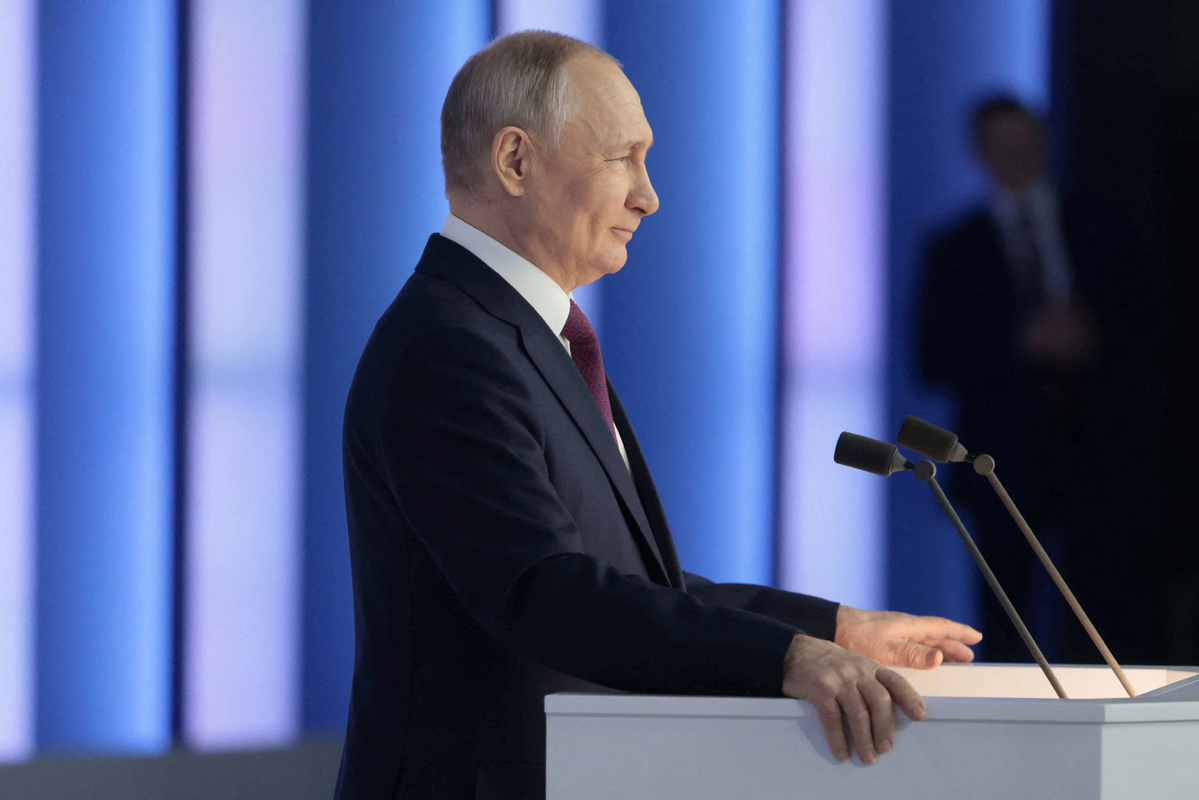
Russian leader accuses US-led alliance of threatening his country's existence
MOSCOW/WARSAW — Russia's President Vladimir Putin says his country will continue its yearlong "special military operation" in Ukraine, and he accused the United States-led NATO alliance of fanning the flames of the conflict in the mistaken belief that it could defeat Moscow in a global confrontation.
Flanked by four Russian flags on either side on Tuesday, Putin told Russia's political and military officials that the country would "carefully and consistently resolve the tasks facing us" in Ukraine.
In addition to the pledge to press on with the fight and warnings to the West of a global confrontation, Putin said the conflict had been forced on Russia and that he understood the pain of the families of those who had fallen in battle.
"The people of Ukraine have become the hostage of the Kyiv regime and its Western overlords, who have effectively occupied this country in the political, military and economic sense.
"They intend to transform a local conflict into a phase of global confrontation. This is exactly how we understand it all, and we will react accordingly, because in this case we are talking about the existence of our country."
Defeating Russia was impossible, he said, and it would never yield to Western attempts to divide its society. A majority of Russians support the country's actions in Ukraine, he said
He asked his audience, including lawmakers, soldiers, spy chiefs and state company bosses, to stand in tribute to those who had lost their lives in the conflict. He promised a special fund for the families of the victims.
With tens of thousands of people killed, Putin said, Russia is locked in an existential battle with an arrogant West, which he says wants to carve up Russia and steal its vast natural resources.
Putin, 70, who was handed the presidency on the last day of 1999 by Boris Yeltsin, said the West had failed to destroy the Russian economy with the severest sanctions in modern history.
"They want to make the people suffer ... but their calculation did not materialize. The Russian economy and the management turned out to be much stronger than they thought."
He called on major Asian businesses to invest in Russia's economy. The $2.1 trillion economy is forecast by the International Monetary Fund to grow 0.3 percent this year, a much better result than was forecast when the conflict began.
In Poland, US President Joe Biden, fresh from a visit to Kyiv, was expected on Tuesday afternoon local time to reaffirm to allies that his country is squarely behind Ukraine and committed to bolstering NATO's eastern flank. Earlier that day, he met Poland's President Andrzej Duda.
Biden arrived in Warsaw late on Monday after a dramatic visit to Kyiv, where he met Ukraine's President Volodymyr Zelensky, who is seeking more weaponry.
More US support to Kyiv
While Biden was in Kyiv, the US State Department announced more support for Ukraine, comprising $450 million of artillery ammunition, anti-armor systems and air defense radars, and $10 million for energy infrastructure.
However, Biden has not acceded to Ukraine's request for fighter jets.
In a speech on Tuesday he was due to rally support for Ukraine as the conflict enters its second year on Friday.
Poland has NATO's longest border with Ukraine and has been the main route in for weapons and out for refugees. Earlier, Duda's foreign policy adviser said the two leaders would discuss Poland's security and scaling up NATO resources there.
Marian Switala, 70, of Warsaw, said he hoped "that this conflict will somehow be resolved and there will be peace in Ukraine and the surrounding area".
Before returning to Washington on Wednesday Biden was due to meet leaders of the Bucharest Nine, the countries on NATO's eastern flank, to reaffirm support for their security.
Agencies via Xinhua

BERLIN -- Without the Russia-Ukraine conflict, the global economy would have generated an additional $1.6 trillion in 2022, according to a study published by the German Economic Institute (IW) on Tuesday.
The conflict has a "high global economic significance," IW expert Michael Groemling said in a statement. Above all, energy and raw material supply problems were putting pressure on companies worldwide.
Western economies were particularly affected as they lost two-thirds of their global production, according to the study.
In Germany, Europe's largest economy, soaring energy prices pushed inflation temporarily above the 10 percent mark in 2022 before relief measures brought prices down again. In January, inflation stabilized at 8.7 percent, according to provisional data published by the Federal Statistical Office.
"High energy prices caused cost shocks at the production level, which became a burden difficult to calculate for many companies," the IW said.
The resulting rise in consumer prices "eroded the purchasing power of households, which cut back their consumption," the institute noted. Finally, companies were reluctant to invest due to the global uncertainty and higher prices.
For 2023, the IW projects an additional global value-added loss of $1 trillion. "Unfortunately, the all-clear is not yet in sight this year," Groemling said, warning that raw material shortages and uncertainty would "continue to occupy us beyond 2023 and cost prosperity."
The International Monetary Fund (IMF) last month raised its forecast for the global economy in 2023 slightly, expecting growth of 2.9 percent instead of 2.7 percent. China's "recent reopening has paved the way for a faster-than-expected recovery," the IMF noted.
